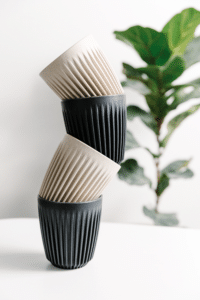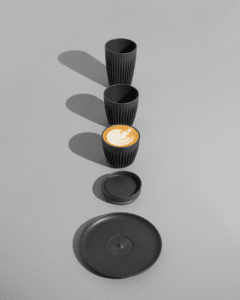Why the HuskeeSwap program is an important step for the coffee community in helping transition from a single-use world, and why it’s set to become the norm in Australian cafés.
When it comes to sustainable behavioural change, it takes time, but it can be done. Supermarket shoppers now take reusable bags to collect their groceries, gym users carry stainless steel drink bottles in hand, and more restaurants are replacing plastic straws with metals ones. In the café scene, there is still a mix of ceramic, reusable, and single-use plastic cups being used, but according to Huskee Operations Manager Michael McFarlane, the end goal is a single-use free environment, and it’s no longer a matter of if but when the transition will occur.
“The great news is that standard reusable cups do currently co-exist with single-use cups. Some cafés are committed to zero waste and some are already 100 per cent Huskee Cup users, but what we really want to see is an industry shift away entirely from single-use cups entirely and to normalise what it means to reuse,” Michael says.
In his experience at Huskee and as a former café owner, he says there is still a lot of miscommunication surrounding single-use cups. Many café owners invest in products they think are recyclable or compostable, only to realise later on that some need to be disposed of in a specific way.
For the past two years, Huskee has been an advocate for the benefits of its reusable cup made from repurposed coffee husk. The HuskeeCup was designed with the HuskeeSwap cup exchange program in mind, with the intention to build a system for cafés to reduce their single-use cups usage, and eventually transition to the new system. The program launched in 2019, then COVID-19 hit, sparkling unwarranted safety concerns.

“It was really frustrating to see so much uncertainty around the use of reusable cups. We saw many cafés introduce a ban, but there was never actually a government ban on reusable cups,” Michael says. “There was a tension point between the café wanting to be perceived by customers as doing everything it could to keep its staff and community safe and healthy, including reducing ‘unnecessary’ risks such as using reusable cups. And on the other side, was uncertainty from the consumer asking their local barista if they still accepted their reusable cup.”
What’s transpired post-COVID however, is a greater influx of cafés wanting to be part of the HuskeeSwap program because of its hygiene benefits – which were already in place pre-COVID but are now noticed and more appreciated, Michael says.
“What we’re seeing is a high number of cafés looking at their invoices and realising how much money they’ve spent on single-use products and how much waste is associated with it,” he says.
“Before COVID, about 20 per cent of cafés on average served customers with a reusable cup. That dipped to about 10 per cent during COVID, and as we get back to business and begin to recover and normalise reusable cup usage, we’re seeing about 40 to 50 per cent of trade using reusable cups.”
Huskee has partnered with nine councils across Australia including the Ballina and Hunters Hill region to Mosman and Lane Cove and Northern Beaches in New South Wales, who are not only helping fund the HuskeeSwap rollout, but encouraging it.
“Council support is giving customers the confidence to know that it’s OK to use reusable cups again, and that their support has an even greater impact on the environment,” Michael says.
Some councils are providing cafés with 12 Huskee float cups and lids to get started in the HuskeeSwap program, which offsets the initial costs.
To date, more than 400 cafés have signed up to the HuskeeSwap program across 22 countries, including Australia, the United States, United Kingdom, and Canada.
Cafés can sign up as a HuskeeSwap supporter and purchase about 12 HuskeeCups to float or have ready for immediate swapping, with a further 12 cups to sell to customers.
The revenue from the sale of the cups offsets the commercial cleaning costs, which is simply done via a dishwater or can be done manually with sanitation concentrate in large bodies of water for a specific time. At scale, there is a component of labour, electricity and water used, but Michael says the operational costs offset each time a HuskeeCup is swapped, saving the café costs associated with buying single-use cups, and diverting another cup sent to landfill.

When the customer drops off their HuskeeCup and lid, the café takes it away for commercial cleaning on-site, along with their other ceramic cups. Staff don’t even need to handle the cups, with drop-off tub options available. The customer then orders their coffee as usual, which is made in a freshly sanitised HuskeeCup.
“The hygiene element was a big consideration for cafés initially, even if the cup presented clean. People started questioning how clean the cup really was if sanitised or simply rinsed at home. The cup still has to travel to the café – via a bag, public transport, even with multiple touching of hands,” Michael says. “Having each cup returned to an active participating HuskeeSwap café and getting it commercially cleaned on-site was the best solution.”
There were also concerns about café workflow and efficiency when handling so many different reusable cups.
“Picture 10 to 20 people holding a reusable cup in their hand, each a different shape, colour, and lid configuration that suddenly alters the barista’s set coffee to milk-ratio recipe. It becomes an inventory and workflow issue,” Michael says.
To eliminate the inconsistencies, Michael says the HuskeeSwap system is the best answer. Its creators have thought of every possible scenario to make it a viable transaction. This includes the ability to borrow a cup, try before you buy, pre-order, and use Huskee’s closed loop program to have used or damaged HuskeeCups collected and repurposed into a new HuskeeCup.
“Now it’s all about driving behavioural change. It can be a slow and difficult journey, but it is worthwhile, and it’s been done before – and the elimination of plastic bags is that example,” Michael says.
All that’s needed is time and positive reinforcement to accelerate change. A restaurant fork has been in hundreds of people’s mouths, and a hotel bed and sheets are slept in by hundreds of people before you – but it’s accepted because customers know it’s been commercially cleaned.
“We understand that this reusable concept is relatively new in a café setting, so we need to be vocal that it’s safe and an effective waste reduction method. We want to make this movement the norm, so when someone hands over a HuskeeCup you’re not asking, ‘is it for the HuskeeSwap program?’ but assuming it is,” Michael says. “The future of reuse is in swapping – its scalable, convenient, and sizes are interchangeable.”
Huskee is excited to build the momentum for its HuskeeSwap program throughout the year, and will continue to reach out to independent cafés, work closely with local councils, school and universities, and connect with the coffee industry in person when it hopes to attend the Melbourne International Coffee Expo in September.
“We’re building for a future without single-use [cups],” Michael says. “There are lots of single-use plastics bans coming into play in the progressive states of South Australia and Queensland, and the Australian Capital Territory, but you can’t just take something away and not have something in place. That’s why we started Huskee two years ago. It’s in place to help transition away from single use so it’s not so much of a shock when we’re forced to.”
For more information, visit huskee.co/swap/
This article appears in the June 2021 edition of BeanScene. Subscribe HERE.




